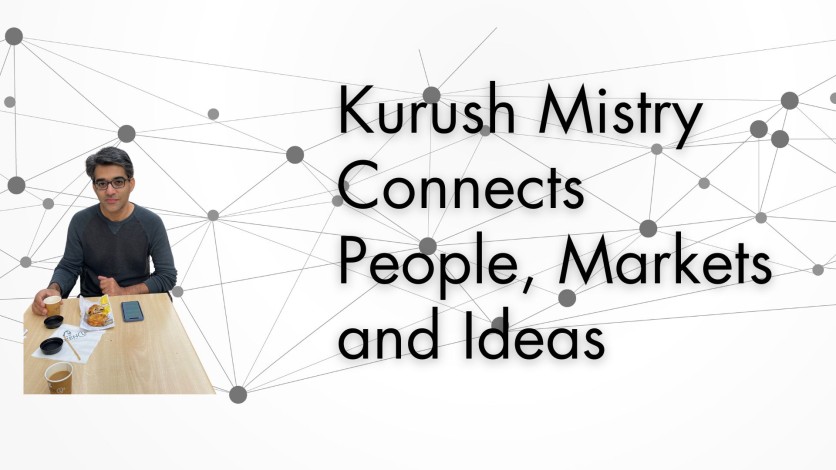
Versatility isn't the first word that pops into your mind when you think "energy analyst." But maybe it should be. Seasoned pro Kurush Mistry's career is marked by just that. As an energy analyst with expertise spanning traditional oil markets and emerging renewable fuels, he combines practical insight with curiosity, and it shows in his pride in mentoring junior colleagues and volunteering to help seniors adapt to new technology.
For Mistry, the trading floor is more than a workplace—it's where collaboration fuels progress. He describes the environment as one of "osmosis," where casual conversations spark fresh insights and teamwork enhances strategies.
"I've seen various kinds of interactions," he shares. "There are some traders who want you to just present them with the supply-demand fundamentals, and then that's it. They take those, and then they figure out what they want to do with it. That's one end of the spectrum."
"The other end of the spectrum is really what I view as the ideal trader-analyst relationship where you're working as a team. The idea that the supply-demand work is initially obviously done by the analyst, but then there is a constant iterative process whereby it's presented to the traders. There's feedback, they speak to someone, and they say, 'No, actually this assumption of yours may not be valid, because I've spoken to someone at refiner and they think what you're saying is wrong.' All right, let's go back and change it. And it's really a team effort in coming up with the best balance, scenarios and trade ideas that one can."
Mistry also sees mentorship as an area where face-to-face interactions remain invaluable. For junior team members, being physically present to observe and engage with colleagues encourages confidence and growth—which is beneficial all around. "When someone's coming in with a little bit of reticence with people, viewing them as junior and not giving them the time of day, sometimes it's very hard," he notes. "I think as organizations and as people who want to grow teams, we should be selfishly motivated to help juniors because we want our teams to grow and our organizations to do well. And we can't do that without physical interaction."
Kurush Mistry and the Move to Renewable Energy
According to McKinsey & Co., "The traditional business model of oil and gas players is under pressure. Investing in the sustainable-power value chain can provide an opportunity to diversify and play a leading role as the industry transitions." Kurush Mistry gets it. His transition from traditional oil markets to renewable fuels reflects his ability to adapt to shifting priorities. After more than a decade in oil trading, he was drawn to renewable energy by its potential to address global energy needs while minimizing environmental impact.
"It opens up those sorts of connections between the specific thing that we're looking at and markets that might not have looked at in the past, and it gives the avenues to explore the future," he notes. "I think what excites me about the future is the fact that we are all trying to solve these problems together without rushing into unrealistic paths."
Using Technology to Build Connections
Outside of work, Kurush Mistry dedicates time to volunteering with seniors and teaching them digital skills. He was inspired after helping his father adapt to smartphone technology, which allowed their family to stay better connected.
"I remember getting my dad to use a smartphone for the first time. That was an interesting experience," he recalls with a laugh.
"But now he's in one city in India, my sister's in another city, I'm over here, and we are able to connect on WhatsApp every day, just chat a few lines on that. And he's able to Google stuff or go to YouTube and watch some videos that he likes. If he had still been on a flip phone, he might have been happy with it, but this whole world wouldn't have opened up and we wouldn't have been able to be as connected."
That experience inspired Mistry to take it to the next level and volunteer to help seniors with new tech. "I've realized that it's really the loneliness and disconnectedness that a lot of elders feel from what they view is a fast-changing and different or new world," he muses. "And you start with problem-solving a couple of things, but then very quickly it gets into you introducing them to an app that re-opens a whole new aspect of life for them."
Blending Creativity and Analytics
Kurush Mistry's problem-solving abilities are enhanced by his creative pursuits. A self-taught musician and former film collaborator, he credits these experiences with broadening his perspective on challenges.
"I've always been more of an analytical, left-brained person," he says. "But exploring music has actually helped broaden my problem-solving abilities in my day job."
"There's an undeniable connection between music and math. The patterns, the structures, the way different elements intertwine—it requires a similar kind of analytical thinking. I found that when I was wrestling with a complex modeling challenge or trying to untangle a web of data, those musical instincts would kick in and help me find a new perspective."
Finding Value in Balance
Kurush Mistry's ability to bridge gaps—between traditional and emerging markets, analytics and creativity, or technology and connection—defines his philosophy on work and life. He views adaptability not as a one-time adjustment but as an ongoing process of learning and applying new ideas.
As industries and individuals navigate evolving challenges, Mistry's insights offer a reminder of the importance of balance. Whether mentoring colleagues, exploring renewable markets, or helping seniors connect with loved ones through technology, he remains focused on fostering relationships and creating growth opportunities.
ⓒ 2025 TECHTIMES.com All rights reserved. Do not reproduce without permission.




